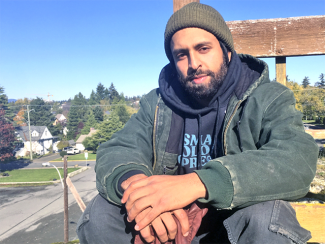TAPPED OUT
Activists build showers for unhoused; city cuts off water

Bilal Bagha, an organizer of the Victoria BC shower stalls project
BILAL BAGHA JUST WENT AHEAD AND DID IT. He and about a dozen other volunteers in Victoria, British Columbia pooled their energies and skills to build two shower stalls for people living in the open without homes. The group plans to install the stalls in Beacon Hill Park—no matter what city officials say.
“It’s been something that the unhoused community has been asking for since Day 1 of the pandemic when all the services shut down,” said Craig Turney, a Victoria carpenter who helped build the showers alongside a group of about a dozen volunteers
“We’re just showing that the community can come together and provide a need to the community and one that the city is not providing.”
With that in mind, the group set about fundraising and were quickly able to raise $3,000 from a clothing sale.
Just do it
The wood and sheet-metal shower stalls are one-metre-square, with a separate area for undressing and dressing. Most of the volunteers, including Aish Haq and Abby Henry, picked up their construction skills on the job while working to build tiny houses for Wet’suwet’en Indigenous land defenders earlier in the year.
“It feels really amazing to help and feel like we’re doing something,” Haq said.
“And actually making a physical difference,” Henry added.
Bilal and the others involved in the shower project first worked together last summer to build tiny houses for Wet’suwet’en Indigenous land defenders. There is nothing formal or structured about how the group operates. They just pick a task and get on with it. Many return build after build with a common intent. Bilal says Henry and Haq walked two hours to participate in the first day of the shower build.
Once two propane hot-water heaters arrive, the group will be ready to set up the two showers in Beacon Hill Park—one of the largest of the 10 main homeless encampments in Victoria.
The people who live in the park will be trusted to operate and maintain the showers themselves. They will receive a stipend, funded by the more than $10,000 in donations the group has raised.
The group plans to install more showers in municipal parks around the city—with or without city approval.
Taking a chance on doing good
But members of the community group, as well as support workers, are worried that bylaw officers and the City of Victoria may take issue with the showers after they are installed, which could lead to their removal.
“Our worry is that we will have put money, time and resources into something, and they take it away,” said Bilal. He’s also concerned about the potential for camps to be moved elsewhere, leaving the showers inaccessible to the community they were built to serve.
“It’s about more than quality of life,” says Janine Theobald, of the Greater Victoria Coalition to End Homelessness. “It’s a basic human need.”
Even if the showers are taken away, Bilal is hopeful others will be inspired to join the effort to provide accessible showers for the homeless.
“We don’t necessarily think our plan is the best plan; we’re just happy for people to get showers in a way that meets their needs,” he said. “It’s been a need in the community for a long time, and it hasn’t been addressed.”
Dead without water
People arrived in Beacon Hill Park November 7 ready to defy the law and connect two shower stalls to city water. They couldn’t. Someone had dug up and removed the water tap.
Victoria’s bylaw officers refused to comment. But the volunteer activists have no doubt city officials ordered the removal of the tap to block efforts to quickly and affordably provide showers for unhoused people.
For now, the two disconnected shower stalls remain in the park with yellow posters on their doors citing the United Nations protocol for homeless encampments in Canada: “The denial of access to water and sanitation by governments constitutes cruel and inhumane treatment, and is prohibited under international rights law.”
“I don’t know what else we can do,” said shower project co-organizer Craig Turney. “The city has access to all the water, and they can just shut it off even if we moved it somewhere else.”
- 30 -













Add new comment